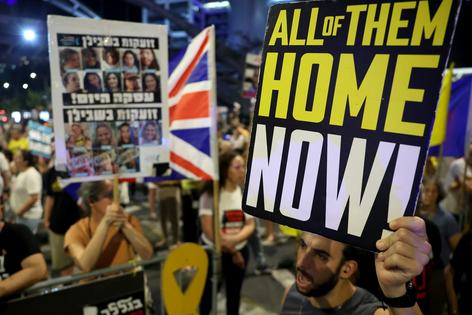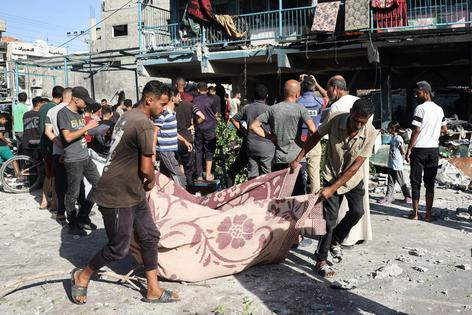How Israel’s Netanyahu survives in his job
Published in Political News
After several tumultuous weeks in Israel, mass demonstrations increasingly depict Prime Minister Benjamin Netanyahu as directly responsible for the fate of the hostages still held by Hamas. Despite mounting internal and international pressure to negotiate a deal with Hamas for the hostages’ release, Netanyahu remains steadfast in his opposition to such an agreement.
Reports in the Israeli and international media accuse Netanyahu of actively attempting to undermine any potential deal.
But despite all that public outcry, Netanyahu’s grip on power appears to be as strong as ever.
Hamas’ surprise attack on Israel nearly one year ago significantly damaged the popularity of Netanyahu and his governing coalition. The government’s inadequate response to the attack, the prolongation of the conflict and the inability to secure the release of all surviving hostages eroded public trust in Netanyahu and his colleagues. Indeed, many anticipated that the government would be dismantled within weeks of the attack.
Yet, notwithstanding the historically low approval ratings of Netanyahu and his government, opposition parties have not been able to capitalize on the situation politically.
On the contrary, despite widespread criticism that the illiberal, religious and ultra-nationalist agenda promoted by Netanyahu and his coalition has severely weakened Israeli social cohesion and played a significant role in Hamas’ decision to initiate the attack, the government has renewed its efforts to push it through.
The forces currently shaping Israel’s political landscape are not simply a battle between Netanyahu’s conservative coalition and a more liberal opposition, nor one between hawks and doves, or pro-war and anti-war constituencies.
As a scholar of Israel’s culture, history and politics, I believe it’s much more complicated.
The vast majority of Israelis greatly mistrust Netanyahu and his government and further believe that continuing the ground military operation in the Gaza Strip, as Netanyahu recommends, risks the hostages’ lives.
Consequently, most Israelis support a deal to return the hostages, to be achieved by agreeing to a cease-fire or even a pullout from Gaza.
It appears, however, that Israeli Jews also agree with Netanyahu that the ultimate goal of the war is to completely uproot Hamas, not to return the hostages, and that Israel is likely to achieve this with the continuation of the war.
To that end, they believe that Israel should not adhere to international laws of war in this fight. A significant majority thinks that crimes and abuses by Israeli soldiers and other security officers should be addressed leniently through disciplinary rather than criminal charges.
It appears, then, that the opposition of Israeli Jews to continuing the Gaza war and the escalating Israeli violence in the West Bank does not stem from their concerns about Palestinian suffering. Rather, their opposition comes from fear it will endanger the lives of the surviving hostages.
The difference between the ruling coalition and many of its critics is thus less about worldview, strategy, tactics or the morality of the actions taken in Gaza, and more about an assessment of Netanyahu’s personality and the performance of his cabinet at times of crisis.
Yair Lapid, leader of the opposition, spoke about Netanyahu very harshly in a recent interview: “The only thing he cares about is staying in power. He’s been in power for too long. He’s interested in power per se and not the power to do good.”
Hamas’ attack, the high civilian death toll and the failure to achieve a quick decisive victory, or even a semblance of one, have cost Netanyahu and his partners the support of the majority of Israelis.
If elections were held today, Netanyahu and his allies would be unable to form a government. But chances of early elections are slim: The current coalition has little interest in calling for new elections, and the majority it enjoys in parliament prevents the opposition from forcing one. That means any attempt to set an early election would need support from at least some members of the coalition.
The unlikelihood that they would be able to form the next government compels the parties within Netanyahu’s coalition to stick together and radicalize their agenda.
Intensifying their efforts to maintain their base, the coalition members insist that their demands should be acted upon now – public outcry, financial cost or international pressure notwithstanding. They appear to hope that by the time elections are eventually held in October 2026, they will have managed to shift voters back to supporting them.
Further, they see the war as an opportunity. The current state of emergency caused by the ongoing war provides the ruling coalition with a pretext to enact illiberal measures that undercut fundamental liberties, including the freedom of expression, of protest and of occupation.
This is the case all the more so when it comes to non-Jewish citizens of the state. Aggravated security concerns in the wake of the war and the fact that many of its critics share, in effect, its worldview allow the ruling coalition to enact legislation and administrative measures that previously met with much greater public and legal resistance.
It is no wonder, then, that the most radical elements in Netanyahu’s coalition, who explicitly promote racism, ethnic cleansing and genocide, have gained disproportionate influence over the government, coalition and the state as a whole.
Netanyahu and his government are unpopular, but their hold on power is secure. They enact policies that many Israeli Jews, though not Israeli Palestinians, support, whether implicitly or explicitly.
Internal tensions within Netanyahu’s coalition — such as those between the ultra-Orthodox and ultra-nationalist factions — could potentially bring it down. Yet each of those parties has a vested interest in its survival.
I believe only an extraordinary event could unseat Netanyahu: a general and unlimited strike supported not only by the Histadrut, which represents the majority of Israel’s labor organizations, but also by employers and the industrial and financial sector as a whole; a de facto or de jure military coup with the backing of all heads of Israel’s military, security and intelligence branches; or a military and financial embargo on Israel.
Given the extraordinary nature of these events, they are very unlikely.
This article is republished from The Conversation, a nonprofit, independent news organization bringing you facts and trustworthy analysis to help you make sense of our complex world. It was written by: Shai P. Ginsburg, Duke University
Read more:
Israel’s highest court protects its power to curb government extremism − 3 essential reads
Israel’s Netanyahu facing off against the supreme court and proposing to limit judicial independence - and 3 other threats to Israeli democracy
Despite his government’s failure to anticipate Hamas’ deadly attack, don’t count Netanyahu out politically
Shai P. Ginsburg does not work for, consult, own shares in or receive funding from any company or organization that would benefit from this article, and has disclosed no relevant affiliations beyond their academic appointment.


























































Comments